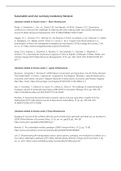Sustainable Land Use: summary mandatory literature
Literature related to lecture series 1 - Blue infrastructure
Wuijts, S., Friederichs, L., Hin, J.A., Schets, F.M., Van Rijswick, H.F.M.W., Driessen, P.P.J. Governance
conditions to overcome the challenges of realizing safe urban bathing water sites (2020) International
Journal of Water Resources Development, DOI: 10.1080/07900627.2020.1755617
Hegger, D.L.T., Driessen, P.P.J., Wiering, M., Van Rijswick, H.F.M.W., Kundzewicz, Z.W., Matczak, P., Crabbé,
A., Raadgever, G.T., Bakker, M.H.N., Priest, S.J., Larrue, C., Ek, K. Toward more flood resilience: Is a
diversification of flood risk management strategies the way forward? (2016) Ecology and Society, 21 (4),
art. no. 52. https://www.ecologyandsociety.org/vol21/iss4/art52/
Koop, S.H.A., Koetsier, L., Doornhof, A., Reinstra, O., Van Leeuwen, C.J., Brouwer, S., Dieperink, C.,
Driessen, P.P.J. Assessing the Governance Capacity of Cities to Address Challenges of Water, Waste, and
Climate Change (2017) Water Resources Management, 31 (11), pp. 3427-3443. DOI: 10.1007/s11269-017-
1677-7
Literature related to lecture series 2 – green infrastructure
Bouwma I., Zinngrebe Y., Runhaar H. (2019) Nature Conservation and Agriculture: Two EU Policy Domains
That Finally Meet?. In: Dries L., Heijman W., Jongeneel R., PurnhagenK., Wesseler J. (eds) EU Bioeconomy
Economics and Policies: Volume II. Palgrave Advances in Bioeconomy: Economics and Policies. Palgrave
Macmillan, Cham. https://link.springer.com/chapter/10.1007/978-3-030-28642-2_9
Kati, V., Hovardas, T., Dieterich, M., Ibisch, P.L., Mihok, B., Selva, N. The challenge of implementing the
European network of protected areas Natura 2000 (2015) Conservation Biology, 29 (1), pp. 260-270.
https://onlinelibrary.wiley.com/doi/full/10.1111/cobi.12366
Runhaar, H. Governing the transformation towards ‘nature-inclusive’ agriculture: insights from the
Netherlands (2017) International Journal of Agricultural Sustainability, 15 (4), pp. 340-349. DOI:
10.1080/14735903.2017.1312096
Literature related to lecture series 3 Grey infrastructure
Flyvbjerg, B. Survival of the unfittest: Why the worst infrastructure gets built-and what we can do about it
(2009) Oxford Review of Economic Policy, 25 (3), art. no. grp024, pp. 344-367.
https://www.jstor.org/stable/23607068?seq=1
Banister, D. The sustainable mobility paradigm (2008) Transport Policy, 15 (2), pp. 73-80.
https://www.sciencedirect.com/science/article/abs/pii/S0967070X07000820
Lah, O. Decarbonizing the transportation sector: policy options, synergies, and institutions to deliver on a
low-carbon stabilization pathway (2017) Wiley Interdisciplinary Reviews: Energy and Environment, 6 (6),
art. no. e257. https://wires.onlinelibrary.wiley.com/doi/abs/10.1002/wene.257
,Literature related to lecture series 4 – Red infrastructure
Van Doren, D., Driessen, P.P.J., Runhaar, H., Giezen, M. Scaling-up low-carbon urban initiatives: Towards a
better understanding (2018) Urban Studies, 55 (1), pp. 175-194. DOI: 10.1177/0042098016640456
Harriet Bulkeley (2021) Climate changed urban futures: environmental politics in the anthropocene city,
Environmental Politics, 30:1-2, 266-284, DOI: 10.1080/09644016.2021.1880713
Wardekker, A., Wilk, B., Brown, V., Uittenbroek, C., Mees, H., Driessen, P., Wassen, M., Molenaar, A., Walda,
J., Runhaar, H. A diagnostic tool for supporting policymaking on urban resilience (2020) Cities, 101, art. no.
102691. https://www.sciencedirect.com/science/article/pii/S0264275119304184
Literature related to lecture series 5 – Governance
Rittel, H.W.J. & M.M. Webber (1973) Dilemmas in a General Theory of Planning, Policy Sciences, vol. 4, pp.
155-169 (14 pp.) https://link.springer.com/article/10.1007/BF01405730
Adger, N., K. Brown, J. Fairbrass, A. Jordan, J. Paavola,S. Rosendo, G. Seyfang (2003) Governance for
sustainability: towards a thick analysis of environmental decision-making, Environment & Planning A, pp.
1095-1110 (15pp.). http://journals.sagepub.com/doi/10.1068/a35289
Termeer, C.J.A.M., Dewulf, A. A small wins framework to overcome the evaluation paradox of governing
wicked problems (2019) Policy and Society, 38 (2), pp. 298-314. DOI: 10.1080/14494035.2018.1497933.
Newig, J., O. Fritsch (2009). Environmental governance: participatory, multi-level and effective?
Environmental Policy and Governance, vol. 19: 197-214.
https://onlinelibrary.wiley.com/doi/abs/10.1002/eet.509
Uittenbroek, C.J., Mees, H.L.P., Hegger, D.L.T., Driessen, P.P.J. (2019): The design of public participation:
who participates, when and how? Insights in climate adaptation planning from the Netherlands, Journal of
Environmental Planning and Management, DOI: 10.1080/09640568.2019.1569503
Patterson, J., Schulz, K., Vervoort, J., van der Hel, S., Widerberg, O., Adler, C., Hurlbert, M., Anderton, K.,
Sethi, M., Barau, A. Exploring the governance and politics of transformations towards sustainability (2017)
Environmental Innovation and Societal Transitions, 24, pp. 1-16.
https://www.sciencedirect.com/science/article/pii/S2210422416300843
Literature related to lecture series 6 – Science-policy interactions
Van Enst, W. I., Driessen, P. P., & Runhaar, H. A. (2014). Towards productive science-policy interfaces: a
research agenda. Journal of Environmental Assessment Policy and Management, 16(01), 1450007.
https://www.jstor.org/stable/enviassepolimana.16.1.08
Cash, D. W., Clark, W. C., Alcock, F., Dickson, N. M., Eckley, N., Guston, D. H., ... & Mitchell, R. B. (2003).
Knowledge systems for sustainable development. Proceedings of the national academy of sciences,
100(14), 8086-8091. http://www.pnas.org/content/100/14/8086
Hegger, D.L.T., Dieperink, C. (2014) Toward successful joint knowledge production for climate change
adaptation: lessons from six regional projects in The Netherlands. Ecology and Society, 19(2):34.
https://www.ecologyandsociety.org/vol19/iss2/art34/
, Norström, A.V., Cvitanovic, C., Löf, M.F., West, S., Wyborn, C., Balvanera, P., Bednarek, A.T., Bennett, E.M.,
Biggs, R., de Bremond, A., Campbell, B.M., Canadell, J.G., Carpenter, S.R., Folke, C., Fulton, E.A., Gaffney,
O., Gelcich, S., Jouffray, J.-B., Leach, M., Le Tissier, M., Martín-López, B., Louder, E., Loutre, M.-F., Meadow,
A.M., Nagendra, H., Payne, D., Peterson, G.D., Reyers, B., Scholes, R., Speranza, C.I., Spierenburg, M.,
Stafford-Smith, M., Tengö, M., van der Hel, S., van Putten, I., Österblom, H. Principles for knowledge co-
production in sustainability research (2020) Nature Sustainability, 3 (3), pp. 182-190.
https://www.nature.com/articles/s41893-019-0448-2/
Bremer, S., Haque, M. M., Aziz, S. B., & Kvamme, S. (2019). ‘My new routine’: Assessing the impact of
citizen science on climate adaptation in Bangladesh. Environmental Science & Policy, 94, 245-257.
https://doi.org/10.1016/j.envsci.2018.12.029
Giebels, D., Van Buuren, A., & Edelenbos, J.. Ecosystem-based management in the Wadden Sea: Principles
for the governance of knowledge (2013) Journal of Sea Research, 82, pp. 176-187.
https://www.sciencedirect.com/science/article/abs/pii/S1385110112001906




